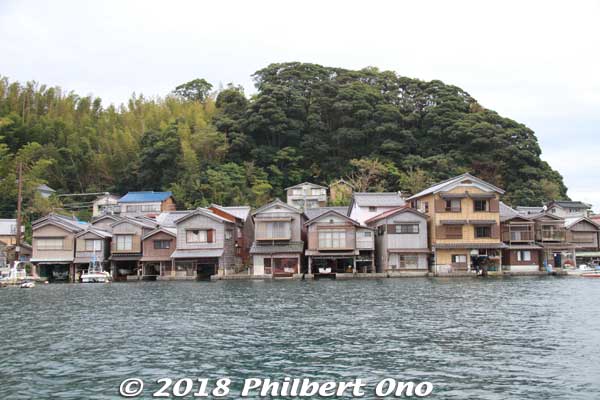
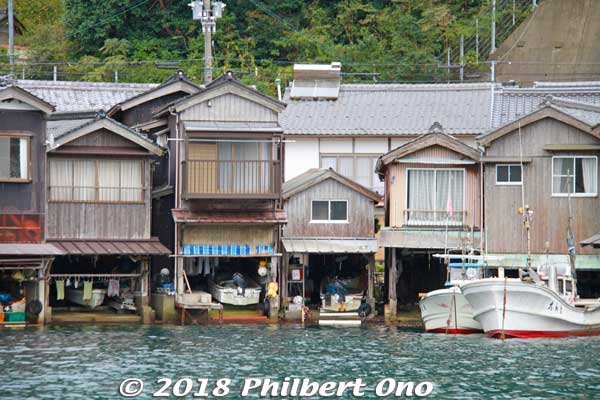
After Amanohashidate, the next must-see place is Tango Peninsula, the main part of Kyoto by the Sea (northern Kyoto). On the east coast of the peninsula is Ine (伊根), a picturesque fishing village right on the water’s edge. The waterfront homes are unique for having built-in funaya “boat garages” (舟屋) to keep a boat next to the water.
The Ine waterfront has looked like this since the 1930s when they reclaimed some of the coastline, and fishermen rebuilt their homes right over the water. This village is designated as an Important Traditional Townscape Preservation District of Japan (重要伝統的建造物 群保存地区) and Japan’s first fishing village to be so designated. Ine has been used as a backdrop in Japanese movies like Tora-san movie No. 29 (1982) and Tsuribaka Nisshi movie No. 5.
Ine has 230 funaya boat houses on the waterfront stretching for about 5 km. Some of the funaya offer lodging where you can stay above the boat garage and have a view of the water. They get booked up quickly though. They let you go fishing by boat or from shore. (Lodging info here.)
You may think these homes are sitting ducks for high waves, typhoons, high tides, etc. But they are in a sheltered bay facing south, away from the Sea of Japan. Mountains shield the bay on three sides and a small island (Aoshima) on the bay’s entrance acts like a breakwater. Ine Bay is thereby largely untouched by the rough seas of the Sea of Japan and the water is very calm. Also, the ocean tide varies by only 50 cm at most.
Ine’s location: https://goo.gl/maps/sXVERESwvMT2
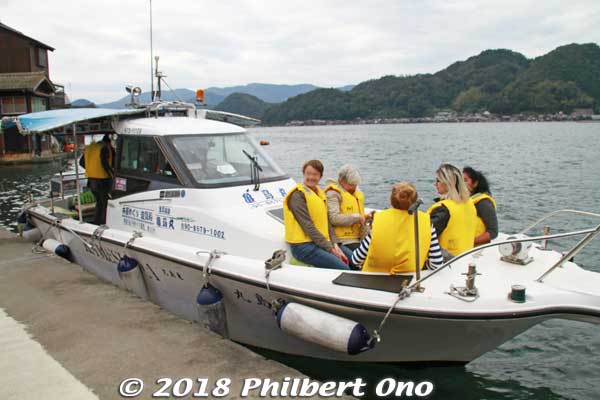
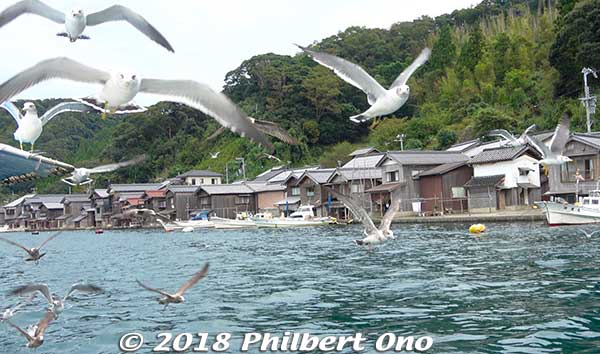
A great way to see the Ine boat houses is by boat (called “sea taxi”). Small boats offer 30-min tours for only ¥1,000 per person. Our boat, seating 12 people, was the Kameshima Maru (亀島丸) operated by Toshikazu Yamada. He pointed out the boat houses and locations used in Japanese movies. Kameshima Maru boat cruises has no cruise schedule so you can just call and set a time for a cruise. There must be at least two people for a cruise to depart.
Phone: 090-8579-1002
Website: http://kameshimamaru.server-shared.com/index.html
Kameshima Maru Ine boat cruise and Ine town tour
Address: Kameshima 822, Ine-cho, Yosa-gun, Kyoto
〒626-0424 京都府与謝郡伊根町字亀島822番地
Boat dock location: https://goo.gl/maps/9zmSW4Nun4P2
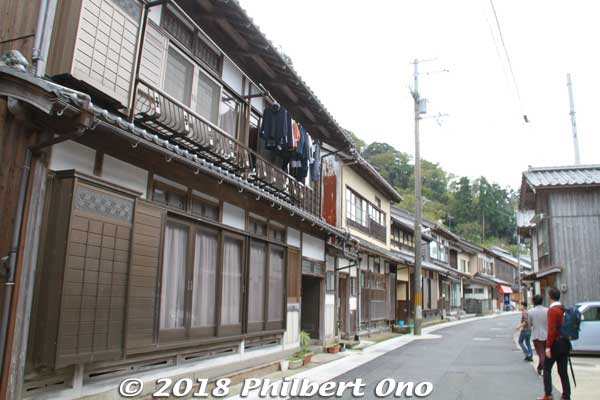
After the boat cruise, we had a guided walking tour of Ine village. Behind the funaya boat houses is this narrow coastal road and another row of homes across the road on the left at the foot of the hills. The homes along the left are the main homes where the fishermen’s family live. And their funaya boat houses are right across the road on the right.
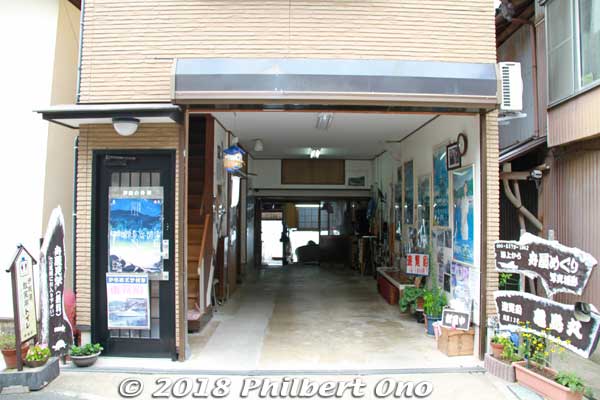
Above is the boat house of Mr. and Mrs. Toshikazu Yamada (山田 敏和), a very friendly fishermen couple who runs Ine boat cruises and work as fishermen. This is what a funaya boat house looks like from the road. The boat house is not that big. It’s usually used as a second house for retired grandparents or for a young married couple who want some privacy. Or it can be used as a workplace, a guesthouse, or inn. First you see a normal car garage.
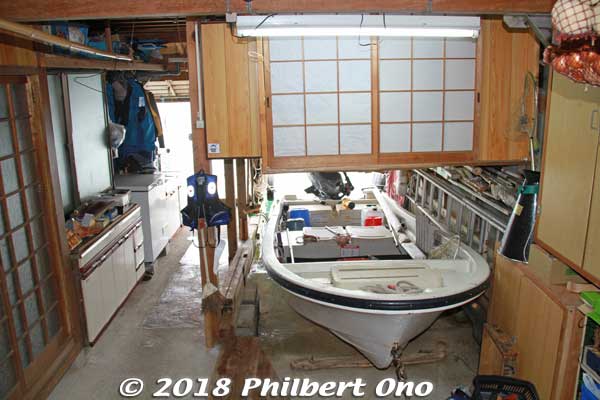
In the back of the car garage is the boat garage on the water’s edge. The small fishing boat is hoisted and secured by a power winch. Above the boat is just storage space (not another room). The family uses the boat to catch fish for themselves.
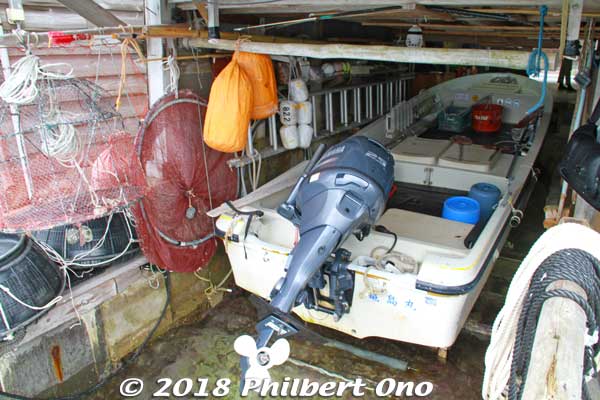
These boat garages were originally built to protect the boat from the elements. In the old days, boats were made of wood. They did not have a waterproof deck like modern boats do today. So the boat garage protected the boat from rain. The boat was also hoisted to dry in the garage. Since seawater tended to rot wood, drying the boat when not in use would make the boat last longer.
I asked about how it was during the recent typhoons in fall 2018. Mrs. Yamada said that the secured boat shook a lot, but there was no damage.
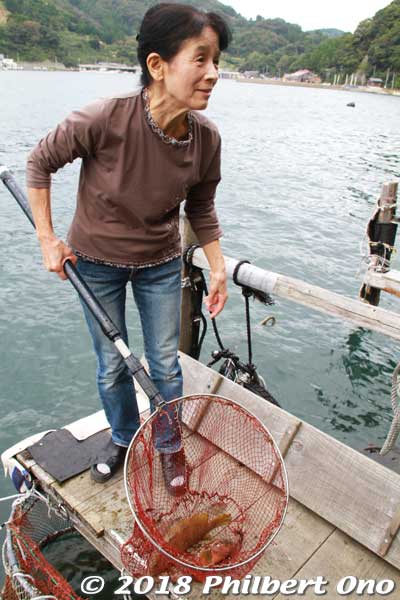
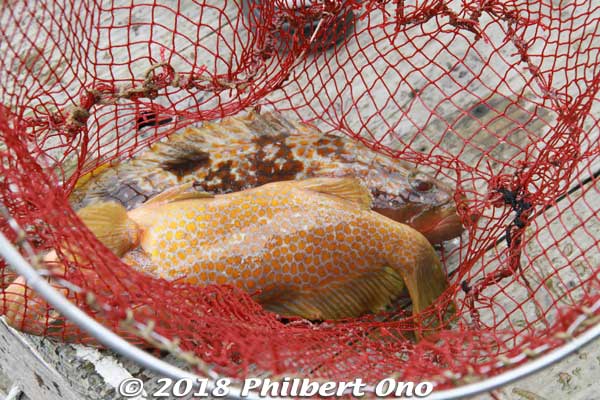
Mrs. Yamada also raises fish under their small dock. I asked what kind of fish, and she caught two to show us. They were Redspotted Grouper (アコウ、キジハタ), a luxury fish delicious as sashimi. They were feeding these fish until they get big enough for eating.
Further down along Ine Bay are a few more tourist spots.
Funaya Shokudo restaurant
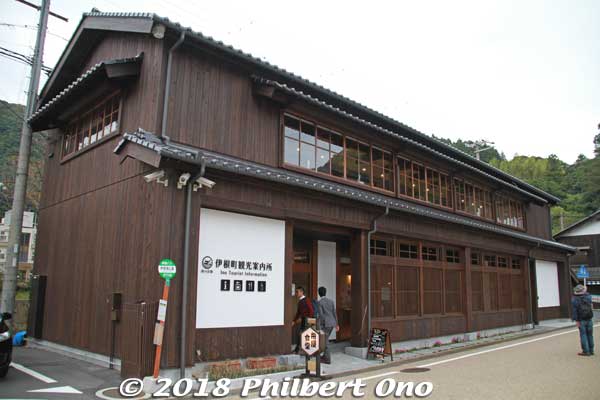
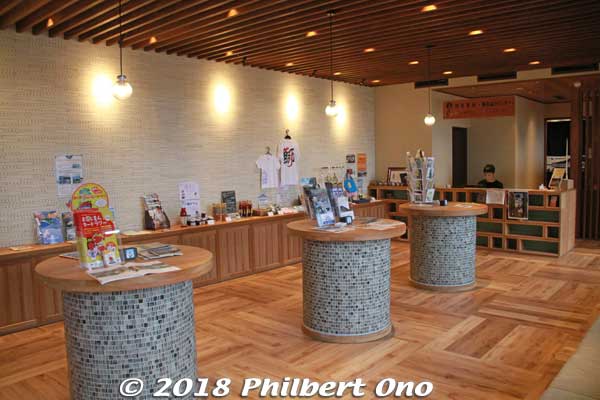
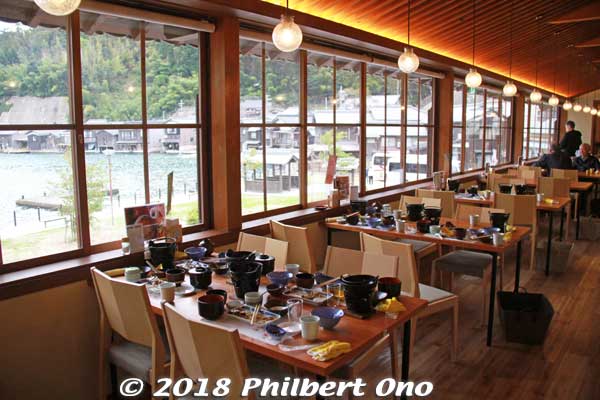
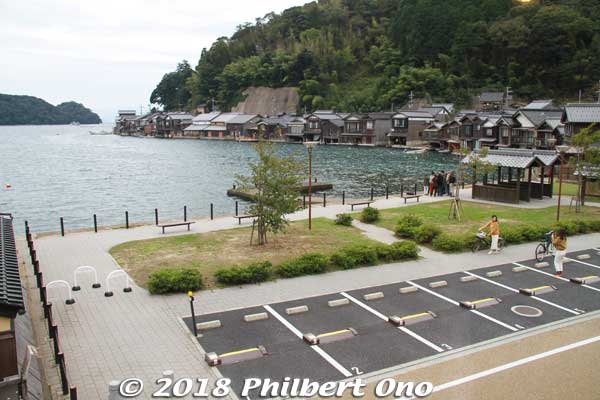
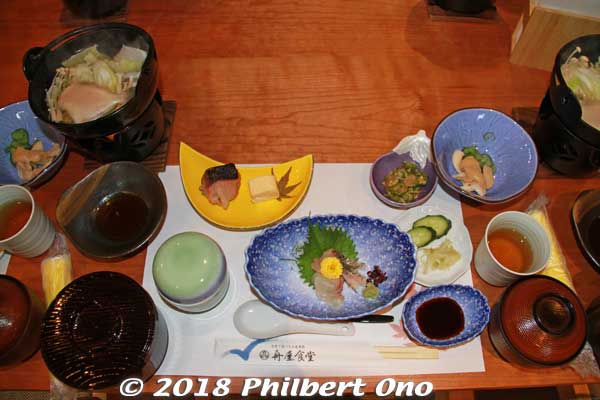
Address
Funaya Shokudo
Hirata 491 (2nd floor), Ine-cho, Yosa-gun, Kyoto
京都府与謝郡伊根町平田491 2F
Phone: 0772‐32‐0800
Open: 8:00–16:00, Closed Thu.
Website: http://www.ine-kankou.jp/taste/funayashokudo/
Restaurant location: https://goo.gl/maps/FNzXKCJKJNQ2
Mukai Shuzo Sake Brewery
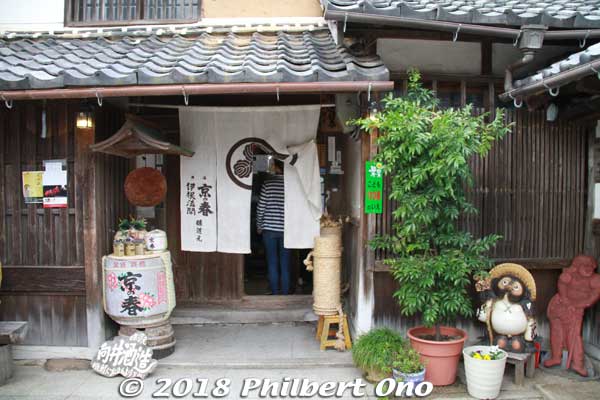
Ine also had a sake brewery called Mukai Shuzo Sake Brewery (向井酒造株式会社) established in 1754. We didn’t tour the brewery. Just went to their gift shop and sampled their stuff. Their main sake brand is called Kyo-no-Haru (京の春). Nice big Japanese evergreen tree outside, 300 years old.
The brewery’s chief brewer is Mukai Kuniko (向井 久仁子) born in 1975 in Ine. She graduated from an agricultural college in Tokyo and took over from her dad. Her younger brother is the president of the company.
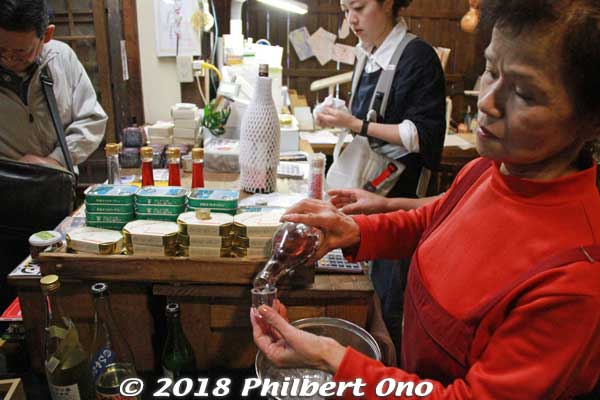
Address
Mukai Shuzo Sake Brewery
Hirata 67, Ine-cho, Yosa-gun, Kyoto
〒626-0423 京都府与謝郡伊根町平田67
Phone: 0772-32-0003
http://kuramoto-mukai.jp/
More photos of Ine: https://photoguide.jp/pix/thumbnails.php?album=1028
Getting to Ine
Closest train stations are Amanohashidate Station and Miyazu Station both on the Kyoto Tango Railway. From JR Kyoto and JR Osaka Stations, there are trains that go directly to Amanohashidate and Miyazu Stations.
From Amanohashidate Station or Miyazu Station, take a local bus (丹後海陸交通) bound for Ine Yubinkyoku-mae, Kama-nyu, or Kyoga-misaki ([経ヶ岬] [蒲入] [伊根郵便局前]). Get off at Ine Yubinkyoku-mae or nearby. Takes about an hour, bus fare is ¥400 from either station. Bus schedule in Japanese: http://www.tankai.jp/
Other Kyoto by the Sea posts:
Amanohashidate – Heaven’s Bridge
Tango Peninsula and Chirimen silk
Amanohashidate (photos)
Chionji Temple
Ine Funaya Boat Houses (photos)
Tango Peninsula (photos)
Tango Chirimen silk fabrics (photos)
Kotohira Jinja Shrine
Chirimen Kaido Road, Yosano
Kurotani Washi Papermaking, Ayabe
Ayabe Farmhouse Lodge
Fukuchiyama Castle
Japanese Oni Exchange Museum, Fukuchiyama
Maizuru Brick Park
Shoeikan Restaurant, Maizuru
Yoshihara Irie, Maizuru